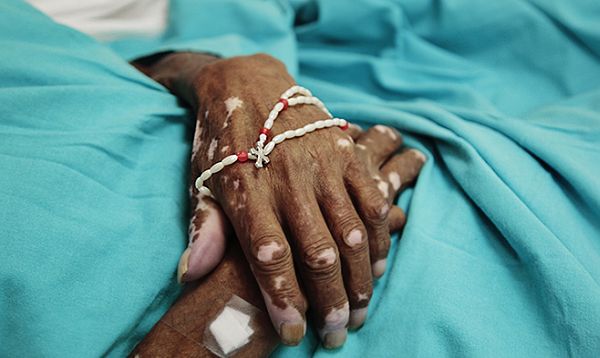Mexico City, Mexico – Tens of thousands of patients with terminal illnesses in Mexico suffer unnecessarily from severe pain and other symptoms because they cannot access adequate end-of-life care, Human Rights Watch reported recently.
The 122-page report, Care When There Is No Cure: Ensuring the Right to Palliative Care in Mexico, documents the lack of access for many patients to pain relief and other assistance known as "palliative care." Although Mexico’s health law explicitly grants people with terminal illness a right to palliative care, the service is offered almost exclusively at large specialist hospitals.
"People with a terminal illness often experience severe pain and other debilitating symptoms that can make the last weeks of their lives unbearable," said Diederik Lohman, associate health director at Human Rights Watch. "Mexico should enforce its own law and provide the pain relief and other treatment they need to ease end-of-life suffering."
Almost 600,000 people die every year in Mexico. Estimates by the World Health Organization and the Worldwide Hospice and Palliative Care Alliance suggest that more than half of these people require palliative care.
The report is based on in-depth interviews with 115 patients, healthcare workers, and officials and a review of relevant regulations and policy documents.
With palliative care mostly available only in major cities, thousands of Mexicans have to travel long distances to get this care, even when desperately ill. Many others have no access at all and die at home in desperate circumstances.
"With the pain, I didn’t have the desire to do anything," said Remedios Ramírez Facio, a 73-year-old woman with pancreatic cancer who had to travel four hours to receive palliative care. "I wasn’t hungry and didn’t want to walk or nothing. It would anger me when people spoke to me. With palliative care I have come back to life."
Adriana Preciado Pérez, whose father, Pedro Preciado Santana, died of lung cancer in 2011 after a long and painful illness, said: "Having my father in palliative care gave us enormous peace of mind."
 |
Until recently, however, the government did little to implement the law, Human Rights Watch found.
Palliative care is not available anywhere in seven of Mexico’s 32 states. Another 17 have just one palliative care service, in the capital city in each case.
The networks that serve people affiliated with all three of Mexico’s largest health insurers – Instituto Mexicano del Seguro Social, Instituto de Seguridad Social y Salud de Trabajadores del Estado, and Seguro Popular – have few facilities that offer palliative care. Only six of Mexico’s 102 medical schools include instruction on palliative care.
A key barrier is the limited accessibility of morphine and other opioid analgesics that are essential for the treatment of moderate and severe pain. Mexican law requires prescriptions for these medicines to contain bar-coded stickers, which physicians can only obtain in person in state capitals. As a result, very few physicians, especially outside of major cities, are licensed to prescribe these medicines, the report found. Moreover, very few pharmacies stock them.
Human Rights Watch found that a radical shift of the status quo is required to ensure that palliative care becomes an integral part of Mexico’s health system. It recommends the active stewardship of the government to develop the infrastructure within the health system capable of delivering palliative care, train sufficient numbers of healthcare workers, and integrate palliative care into financing structures and insurance packages.
In the past year, the Mexican government has worked closely with independent groups to begin addressing barriers to getting palliative care. It has taken or announced a number of key steps to improve its availability:
• Seguro Popular, one of Mexico's three largest health insurers, has added treatment for pain and several other common symptoms in patients who require palliative care to its insurance package.
• The Health Ministry has developed the official implementing norm for the 2009 amendments. The health minister has also instructed her ministry to work with Fundacion Mexicana para la Salud, a leading Mexican health nongovernmental group, to work on a national palliative care strategy.
• Comisión Federal para la Protección contra Riesgos Sanitarios, Mexico’s regulatory agency for medicines, announced a new electronic system for prescribing opioid analgesics, which will allow physicians to obtain bar-coded stickers through a secure website and pharmacists to record all transactions involving these medicines electronically. The new system is expected to be operational in early 2015.
"These are important steps that will hopefully benefit thousands of patients," Lohman said. "But they should only be the beginning of a concerted government effort to ensure that everyone in Mexico has access to good health services at the end of life."
Original Story


